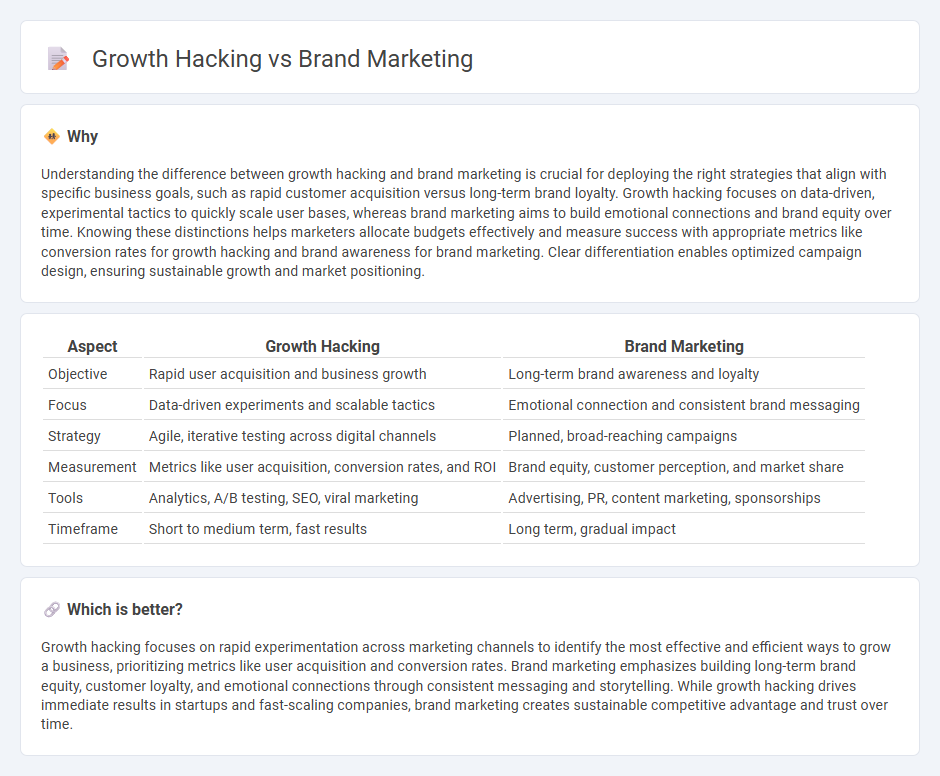
Growth hacking leverages data-driven experiments and rapid testing to identify scalable marketing strategies that accelerate business growth. Brand marketing focuses on building long-term brand identity, customer loyalty, and emotional connections through consistent messaging and storytelling. Explore the differences and benefits of these approaches to enhance your marketing strategy.
Why it is important
Understanding the difference between growth hacking and brand marketing is crucial for deploying the right strategies that align with specific business goals, such as rapid customer acquisition versus long-term brand loyalty. Growth hacking focuses on data-driven, experimental tactics to quickly scale user bases, whereas brand marketing aims to build emotional connections and brand equity over time. Knowing these distinctions helps marketers allocate budgets effectively and measure success with appropriate metrics like conversion rates for growth hacking and brand awareness for brand marketing. Clear differentiation enables optimized campaign design, ensuring sustainable growth and market positioning.
Comparison Table
| Aspect | Growth Hacking | Brand Marketing |
|---|---|---|
| Objective | Rapid user acquisition and business growth | Long-term brand awareness and loyalty |
| Focus | Data-driven experiments and scalable tactics | Emotional connection and consistent brand messaging |
| Strategy | Agile, iterative testing across digital channels | Planned, broad-reaching campaigns |
| Measurement | Metrics like user acquisition, conversion rates, and ROI | Brand equity, customer perception, and market share |
| Tools | Analytics, A/B testing, SEO, viral marketing | Advertising, PR, content marketing, sponsorships |
| Timeframe | Short to medium term, fast results | Long term, gradual impact |
Which is better?
Growth hacking focuses on rapid experimentation across marketing channels to identify the most effective and efficient ways to grow a business, prioritizing metrics like user acquisition and conversion rates. Brand marketing emphasizes building long-term brand equity, customer loyalty, and emotional connections through consistent messaging and storytelling. While growth hacking drives immediate results in startups and fast-scaling companies, brand marketing creates sustainable competitive advantage and trust over time.
Connection
Growth hacking leverages data-driven experiments and rapid iteration to accelerate user acquisition and business growth, directly influencing brand marketing by increasing brand visibility and engagement. Brand marketing establishes a strong emotional connection and trust with the audience, which amplifies the effectiveness of growth hacking strategies by enhancing customer retention and referral rates. The synergy between growth hacking's tactical agility and brand marketing's strategic positioning drives sustainable business expansion and market differentiation.
Key Terms
Brand marketing:
Brand marketing emphasizes building long-term brand equity by creating consistent messaging, emotional connections, and trust with the target audience. It involves strategic storytelling, visual identity, and positioning to differentiate the brand in competitive markets. Discover more about how brand marketing drives sustainable business success and customer loyalty.
Brand Identity
Brand marketing centers on establishing a strong brand identity through consistent messaging, visual elements, and emotional connections that foster long-term customer loyalty. Growth hacking prioritizes rapid experimentation and data-driven tactics to quickly scale user acquisition, often sacrificing brand consistency for short-term gains. Explore how aligning brand identity with growth strategies can maximize business success.
Brand Equity
Brand marketing centers on building long-term brand equity by creating consistent, memorable brand experiences that foster customer loyalty and trust. Growth hacking prioritizes rapid experimentation across marketing channels and product development to quickly acquire and retain customers, often sacrificing long-term brand identity for short-term gains. Discover how balancing brand marketing and growth hacking can maximize both brand equity and accelerated business growth.
Source and External Links
What is brand marketing? - Funnel - Brand marketing is the art of creating an emotional connection and unique identity for a company beyond just products, focusing on trust and loyalty through long-term engagement with brand elements like visuals, storytelling, and customer experience.
What Is Brand Marketing? | VistaPrint US - Brand marketing promotes a business by building a strong, recognizable identity that fosters trust and emotional connections, shaping how customers perceive the whole business rather than individual products.
What is Brand Marketing? Definition and examples - Amazon Ads - Brand marketing focuses on establishing and growing a relationship between a brand and consumers by promoting the brand as a whole, using products and services as proof points to support the brand's promise.
 dowidth.com
dowidth.com